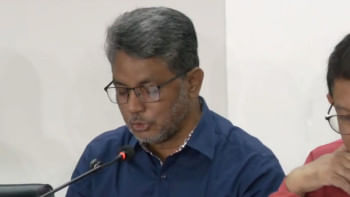Fraudulent trade deals enable money laundering: study

Fraudulent trade transactions are one of the key reasons behind the rise in non-performing loans (NPLs) in Bangladesh's banking sector, creating a dangerous feedback loop that undermines financial stability and enables trade-based money laundering (TBML), according to a study by the Bangladesh Institute of Bank Management (BIBM).
At the end of March 2025, banking sector bad loans hit Tk 420,335 crore, the highest in the country's history, painting a clearer picture of the rot in the banking system.
The BIBM study, titled Enforcement Status of the Standards to Prevent Trade-Based Money Laundering, is set to be published today.
The study report, seen by The Daily Star, suggests that when criminals forge export-import documents or mis-invoice export-import deals, banks often extend credit based on fictitious paperwork. Once these deals are executed, the loans inevitably default, contributing to the mounting pile of NPLs.
It points out that despite the issuance of TBML guidelines by the Bangladesh Financial Intelligence Unit (BFIU), enforcement remains patchy.
"A nationwide survey of 37 banks conducted by BIBM found that while 100 percent claim to have sanction screening systems, only 50 percent subscribe to price verification tools like Global Trade Tracker or Bloomberg to mitigate the risk of trade-based money laundering," the report states.
Worse still, only 40 percent of banks have centralised price verification units, making uniform monitoring difficult.
Even more worrying is the reliance on manual processes.
"Banks often lack automated escalation mechanisms to flag and investigate suspicious transactions. A three-tier escalation system, mandated in the guidelines, is frequently bypassed. Decisions are often made verbally and undocumented, compromising audit trails and regulatory scrutiny," reads the report.
The report goes on to state that TBML is now widely acknowledged as one of the most complex and underreported forms of money laundering, globally accounting for nearly 30 percent of laundering schemes.
In Bangladesh, it is far more serious. Nearly 75 percent of domestic money laundering is believed to occur through trade channels, according to the National Board of Revenue, it adds.
"The scale is staggering. A 2024 white paper estimated annual trade-related outflows from Bangladesh at $16 billion, equivalent to 3.4 percent of the GDP—more than the nation's total yearly health budget. These losses, often facilitated through over- or under-invoicing and phantom shipments, erode the country's foreign exchange reserves, reduce customs revenue, and inflate the cost of doing business," reads the report.
The BIBM report identifies the lack of enterprise-level TBML risk analysis in many banks as another major concern.
"Despite all banks claiming to review TBML alerts, few have year-round review teams or structured methods for disseminating red flags and regulatory updates across departments. This knowledge gap at the operational level severely undermines the effectiveness of even the best-designed policies," it states.
BIBM warns that Bangladesh's banking system remains largely decentralised in handling trade finance.
Roughly one-third of banks continue to route trade-related operations through branch-level or siloed systems, rather than adopting a centralised model, increasing the risk of oversight failures. In contrast, countries like Singapore and Finland use centralised processing, which allows better enforcement, clearer accountability and stronger audit trails, the report says.
Though banks are required to conduct risk-based Know Your Customer (KYC) checks for all letters of credit (LCs) and export financing, as per BFIU's 2019 guidelines, real-time credit checks and customer verification often fall short in practice, it states, adding that relationship managers are tasked with verifying details using Credit Information Bureau (CIB) data, but oversight remains inconsistent.
The research team was led by Shah Md Ahsan Habib, professor (selection grade) at BIBM, with contributions from Tofayel Ahmed, Anila Ali, Shah Alam Kazi, Md Mahmudur Rahman, and ATM Nesarul Hoque.
Other team members are Tofayel Ahmed, assistant professor of BIBM; Anila Ali, assistant professor of BIBM; Shah Alam Kazi, joint director of BFIU; Md Mahmudur Rahman, DMD of Islami Bank Bangladesh; and ATM Nesarul Hoque, executive vice president of Mutual Trust Bank.
The paper recommends the establishment of a Trade Transparency Unit combining customs and BFIU data, publishing a public beneficial ownership register, and expanding KYC/AML duties to freight and warehouse operators.
It also calls for building an automated, analytics-driven compliance culture backed by strong institutional incentives and penalties for non-compliance.
In a country heavily reliant on exports and foreign credit lines, reining in trade-based money laundering is not optional—it is a fiscal and strategic necessity, the BIBM report notes.
Without urgent reform, it says, Bangladesh risks not only massive revenue losses but also falling behind in global anti-money laundering benchmarks, inviting greylisting and higher transaction costs for its legitimate trade.

 For all latest news, follow The Daily Star's Google News channel.
For all latest news, follow The Daily Star's Google News channel. 








Comments